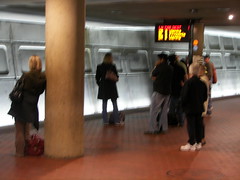Too much information
From "No signs ahead" in the Boston Globe:
According to some researchers who study the psychology of driving, an overabundance of traffic signs makes drivers less likely to pay attention to any of them. And yet at the same time, drivers also pay less attention to their surroundings, secure in the knowledge that there will be instructions quite literally at every turn.
The researchers say the solution to this problem is to reduce -- or perhaps even eliminate -- traffic signage. It's a solution the European Union, for one, is giving a try.
The idea is that with fewer signs telling you how to behave, you'll pay more attention to the ones that are left. And because you'll be forced to figure more things out for yourself, you'll pay more attention to driving as well.
"There's an optimal level of workload. When there's less info, drivers have to concentrate more," says David A. Noyce, who directs the Wisconsin Traffic Operations and Safety Laboratory at the University of Wisconsin. He says when there are fewer signs, drivers naturally start focusing on other cues (the speed of cars ahead of them, for example) to determine how to safely proceed.
-------------
1. I remember similar results from research on college teaching, that providing too much information in lectures hindered information retention.

2. I feel this way about the announcements on the subway system. Every time the doors open and close you hear announcements, plus the announcements arriving in and leaving stations, plus whatever security and other announcements on the platforms.
It's beginning to be a reason not to ride the subway.
3. And speaking of overstimulating and commodifying every possible commercial space, the Toronto Star reports that advertising television is being tested in cabs in that city, in the article "Cab passengers get ads on the go: A small screen in some Toronto taxis is enticing riders to spend beyond the fare."
I recommend bicycling.
Index Keywords: behavior



0 Comments:
Post a Comment
<< Home